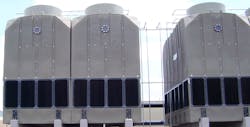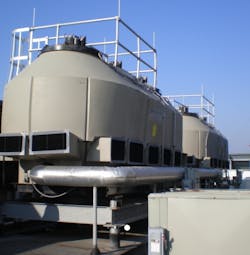Corrosion is always a top concern for any chemical processing facility, be it the metal alloys that come into direct contact with caustic chemicals or the components that make up the rest of the processing system. Everything must be relied upon to withstand the highly corrosive atmosphere that surrounds a chemical plant operation.
A key piece of these chemical manufacturing systems are the cooling towers used as an efficient way to reduce the heat created during the chemical reaction process. The process water absorbs the heat, such as that from water-jacketed reaction vessels, and transfers it to the cooling tower. The tower is then able to exhaust the heat into the atmosphere and return the cooled water in an open loop back through the process.
Galvanized-metal cooling towers, however, consistently fail the corrosion durability test at chemical plants and are increasingly being replaced with corrosion-resistant engineered-plastic cooling towers.
As an example, a major chemical manufacturer located in North Carolina spent decades replacing its metal towers with the same material without realizing there was a better alternative.
“We introduced them to engineered plastic towers back in 2010 which was installed at their main operating facility in the area,” says Chuck Parnell, sales engineer at Mechanical Equipment Company (MECO). “Prior to that, they had been using metal-clad towers and they were very unhappy about the extensive maintenance and downtime that was required for those units.”
MECO is an Industrial equipment supplier that designs, installs, and services mechanical and industrial equipment throughout North and South Carolina. The company also engineers and fabricates process skid systems.
Coming to a conclusion
Recently, the chemical manufacturer completed construction of a new 20,000-square-foot facility for the research and development of new products designed for the petrochemical, industrial, agricultural and household markets.
“After more than a decade of using the engineered plastic towers they were done experimenting,” says Parnell. “We installed the entire mechanical system — pumps, controls, everything — and they only really had one demand; HDPE cooling towers.”
High-density polyethylene (HDPE) cooling towers were pioneered by Delta Cooling in the 1970’s. The engineered plastic towers are impervious to corrosive environments and require fewer expensive water treatment chemicals as well as less downtime for repair or replacement.
Fusing durability and cost
Back when the chemical company was utilizing metal towers, trace chemicals from the manufacturing process were mixing with the water in the towers, altering the pH, and promoting oxidation reactions, similar to what occurs to metal near oceans.
“If you’re in a coastal region, with salt air, that’s a tough environment for a metal cooling tower,” adds Parnell. “Likewise, chemical plants have highly corrosive atmospheres and that takes a toll.”
The burden in this case for the North Carolina chemical processor was extensive. The old metal towers typically lasted only a few years before the intensive maintenance kicked in. Then at around 5-to-8 years, the company was forced to completely replace its entire line of towers, only to see the cycle repeat itself.
Longevity is perhaps the single biggest feature of HDPE cooling towers. In fact, many of the first towers installed are still in operation today — some as much as 40 years later. Delta backs up that longevity by offering a 20-year warranty on the engineered plastic shell.
Parnell says that durability pays off by greatly reducing the total cost of ownership. In fact, he says the costs of operating an HDPE cooling tower reduces ongoing costs in a number of ways.
“They require less maintenance, water, and electricity and have a price point that is actually right in line with most metal-clad options,” says Parnell. “It is a no-brainer.”
Energy catalyst
While looking for a reliable, cost-effective solution is always a priority for any company investing in a new cooling tower system, the energy savings offered by many HDPE models is evolving into a major selling point as well.
“As a chemical manufacturer, they’re all about instrumentation and control,” Parnell said of his North Carolina client. “They operate 24 hours a day, but their cooling needs are dynamic. The ability to adapt cooling to run efficiently saves electricity without sacrificing cooling power.”
Parnell helped the chemical manufacturer set up an array of cooling towers that could be optimized for peak efficiency. First, he selected the Delta Cooling Premier induced-draft model for the new facility, and he spread their total cooling capacity — 1,050 tons — across three towers: one 250-ton unit and two 400-ton units.
Additionally, the cooling towers feature variable frequency drive (VFD) fans. This lets them vary the fan speed and avoid running them at max RPM except when necessary. Tailoring fan usage to cooling demand brings further efficiency and savings, but the efficiencies of HDPE go even further.
“For the same cooling tons, an HDPE tower can be smaller than a comparable metal tower,” adds Parnell. “The Delta engineers have come up with a design that minimizes fan horsepower without sacrificing cooling capacity.”
These efficiencies in the design of the HDPE cooling towers have been estimated to reduce energy consumption by as much as 40% which equates to substantial savings for heavy industrial operations.
Moreover, due to the fact that HDPE cooling towers do not leak or require fine-tuned chemical water treatment, as is a common complaint with standard metal-clad units, users save on both water usage and expensive treatment chemicals.
“Based on experience, they determined that the high-density polyethylene provides them with a more reliable tower,” concludes Parnell.
In chemical manufacturing, where efficient output is essential for profitability, HDPE cooling towers are proving to be a formula for success.
Phillip Dryden is a Dallas-based freelance writer who has more than ten years of experience writing for mechanical engineering and the chemical processing industry.





